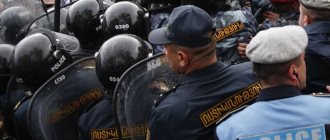What legislative acts establish the rules for the use of explosives?
These include:
- Federal Law No. 257 of November 8, 2007 (explains the issue of transporting dangerous goods by vehicles);
- Decree of the Government of the Russian Federation No. 372 of April 23, 1994 (contains measures to ensure safety during the transportation of dangerous goods);
- Order of the Ministry of Transport of Russia No. 73 dated 08.08.1995 (also a list of measures for the transportation of such goods);
- Traffic rules (you can find a number of similar rules there);
- Decree of the Government of the Russian Federation No. 513 of July 12, 2000 (is a list of measures used for security in the production and distribution of explosives);
- Art. 22 Federal Law No. 176 of July 17, 1999 (it contains a list of objects prohibited for sending in parcels across the territory of the Russian Federation).
This is an incomplete list of all legislative acts, since it is necessary to take into account both various resolutions of local governments and those adopted by the constituent entities of the Russian Federation.
To qualify a crime, it is very important to establish which specific legal act in the field of accounting, storage, transportation and use of explosives, flammable substances and pyrotechnic products was violated.
When an act is considered an offense
The law describes dangerous acts that fall into the category of offenses of medium gravity due to negligence.
Subjects of the offense:
- Explosives . They are understood as mixtures of substances that are capable of rapid chemical transformation or explosion without access to oxygen. These include TNT, gunpowder, rocket fuel, etc.
- Highly flammable . These are substances capable of spontaneous combustion or rapid combustion from any external source. For example, acetone, gasoline, oxygen, etc.
- Pyrotechnic products . Industrial or homemade devices that contain flammable or explosive substances intended for fireworks or noise effects.
The objective side is characterized by those actions that are listed in Art. 218 of the Criminal Code of the Russian Federation. It takes two forms: action (carriage of explosive substances in a container not intended for this purpose) and inaction (improper storage or packaging of pyrotechnic products).
The subjective side is expressed in a careless form of guilt. This means that a citizen may understand that negative consequences will occur as a result of his misconduct, but ignores this or treats it with negligence.
The corpus delicti is material. The offense is considered completed when serious damage to a person’s health or death occurs.
Objects and subjects of crimes
The object of the offense is determined by public safety in the field of the use of explosive substances, and the additional object is human health and life.
The subject is a sane person over 16 years of age and, by the nature of his activity, performing one of the actions listed in Art. 255 of the Criminal Code of the Russian Federation.
How is it proven
To prove such an offense, it is necessary to establish how it was carried out and what specific legal acts were violated.
If the accounting of explosive substances was carried out with obvious violations, then all registers and other documents that should have indicated their presence are checked.
In case of violation of the storage of such objects, law enforcement officers go to the place of their storage or look at what containers or boxes they were kept in.
Transportation of explosive substances must be carried out in accordance with traffic regulations and accompanied by a responsible person. If these conditions were not met, then they check which specific points of the traffic rules were violated and whether the above-mentioned person was with such dangerous cargo.
When using these substances, all safety rules are followed, and if they are ignored, they establish where exactly the safety instructions were violated.
Such items must be sent in strict accordance with safety precautions and in special packaging. If this does not happen, then they check in which containers and how they were sent.
If serious harm to a person’s health is caused or death occurs, an appropriate medical report certified by a doctor will be required. It is provided to the investigation and added to the case materials.
At the same time, the chemical composition of explosive substances is analyzed. This is done by experts who specialize in the relevant field.
Second commentary to Art. 144 of the Criminal Code of the Russian Federation
1. The object of the crime provided for in Art. 144 of the Criminal Code is freedom of mass information, which is one of the forms of the rights of citizens guaranteed by the Constitution of the Russian Federation to freedom of thought, speech, opinions and beliefs, as well as the right to search, receive and transmit, produce, disseminate information in any legal way (Article 29).
2. The objective side of the crime provided for in Part 1 of Art. 144 of the Criminal Code, is expressed in actions characterized by obstructing the legitimate professional activities of journalists by forcing them to disseminate or refuse to disseminate information.
Obstruction means opposition to the legitimate professional activities of journalists, i.e. persons involved in collecting, creating, editing or preparing materials for the media.
Coercion as a method of obstruction means physical or mental pressure on a journalist. Physical impact is expressed in the intentional infliction of minor harm to health (Article 115 of the Criminal Code of the Russian Federation) or beatings (Article 116 of the Criminal Code of the Russian Federation); mental influence - in the threat of violence against the journalist or his relatives, damage or destruction of their property, dissemination of disgraceful information about them.
3. The subject of a crime under Part 1 of Art. 144 of the Criminal Code of the Russian Federation is a person who has reached the age of 16.
4. The subjective side of the crime provided for in Art. 144 of the Criminal Code, is characterized by direct intent.
5. Part 2 of Article 144 of the Criminal Code establishes increased liability if the crime was committed using the perpetrator’s official position.
6. Part 3 art. 144 of the Criminal Code provides for the corpus delicti of this crime under especially qualifying circumstances: acts provided for in Part. 1 or 2 tbsp. 144 of the Criminal Code, connected with violence against a journalist or his relatives or with damage or destruction of their property, as well as with the threat of using such violence.
Article 228 part 4 of the Criminal Code of the Russian Federation
Punishment under Art. 228, part 4 Art. 228 part 4 consists of two parts, which define liability for illegal transactions with precursors of psychotropic and narcotic drugs, committed on a large and especially large scale.
- imprisonment for up to five years with a fine in the amount of 200 to 300 thousand rubles or in the amount of the income of the offender for a period of up to 9 months or without it.
- restriction of freedom for up to four years;
The same acts, committed on an especially large scale or with the presence of aggravating circumstances, entail punishment:
- up to five years of imprisonment with a fine of 200 to 500 thousand rubles, or in the amount of the offender’s income for a period of up to 9 months or without it, or with restriction of freedom for up to two years or without it.
- up to four years of restriction of freedom;
Sources
- Conformity assessment methods No. 8 2013; Standards and quality - M., 2013. - 671 p.
- You are a land user. Rights, obligations, conditions, benefits. - M.: AST, 2004. - 352 p.
- Georgy Borisovich Romanovsky Biomedical law in Russia and abroad; Prospect - M., 2002. - 280 p.
- Khabrieva, T. Ya. Migration law of Russia. Theory and practice: monograph. / T.Ya. Khabrieva. - M.: Jurisprudence, 2008. - 206 p.
- A set of reviews from departments... to legitimize changes to the Code of Laws / Absent. - Moscow: Lights, 2002. - 139 p.
On approval of the Criminal Code of the RSFSR
(SZ RF, 1996, No. 1, Art. 54);_________________________________________________________________________ The Criminal Code of the RSFSR has the task of protecting the social system of the USSR, its political and economic systems, personality, rights and freedoms of citizens, all forms of property and the entire socialist legal order from criminal attacks (as amended .).To achieve this task, the Criminal Code of the RSFSR determines which socially dangerous acts are criminal and establishes penalties to be applied to persons who have committed crimes (as amended by the Decree of the Presidium of the Supreme Council of the RSFSR of December 3, 1982
- Gazette of the Supreme Soviet of the RSFSR. 1982, N 49, art. 1821).The Criminal Code of the RSFSR is based on the principles and general provisions established by the Fundamentals of the Criminal Legislation of the USSR and Union Republics. All-Union laws on criminal liability for state crimes and military crimes, as well as all-Union laws defining liability for other crimes directed against the interests of the USSR are included in this Code. Until all-Union criminal laws are included in the Criminal Code of the RSFSR, they are applied directly on the territory of the RSFSR. The general part of the Code applies both to the acts specified in this Code and to acts for which liability is provided for by all-Union laws that have not yet been included in this Code. Criminal liability and only a person guilty of committing a crime is subject to punishment, that is, who has intentionally or through negligence committed a socially dangerous act provided for by criminal law. No one can be found guilty of committing a crime, or subjected to criminal punishment except by a court verdict and in accordance with the law (edited)
Decree of the Presidium of the Supreme Soviet of the RSFSR of December 3, 1982
Decree of the Presidium of the Supreme Soviet of the RSFSR of December 3, 1982









